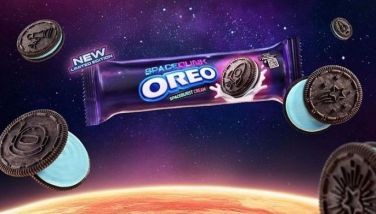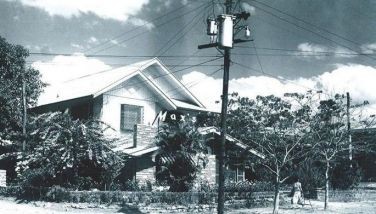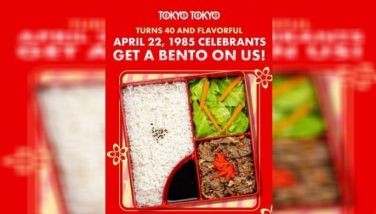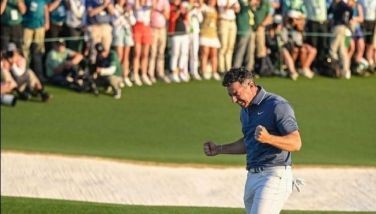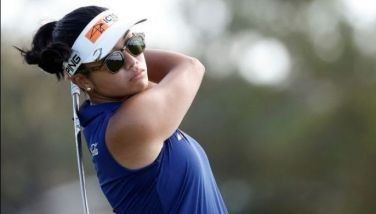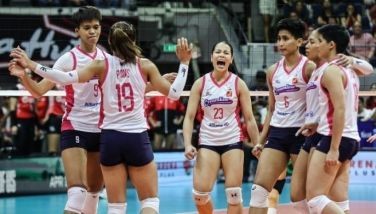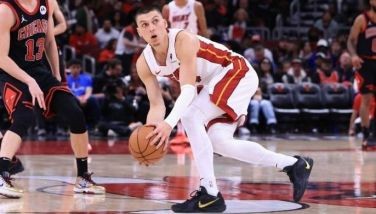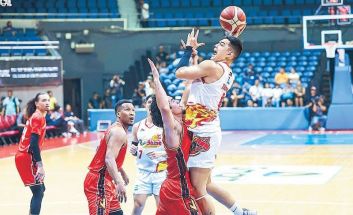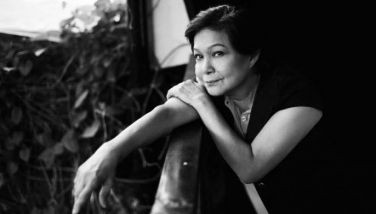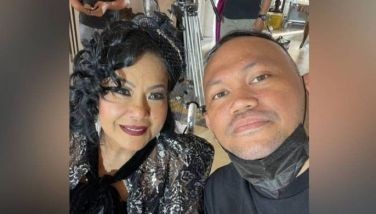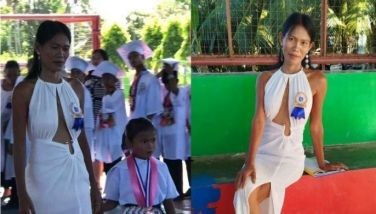Francis Arnaiz speaks
May 1, 2004 | 12:00am
"I was born to play basketball. At a very young age, I could already hear the crowd. I could already imagine that last shot. And I’m really serious. At four years old — I didn’t even have a basketball then — the only thing I had in my hand was a stuffed toy. The goal was my hamper where we’d throw the dirty clothes. Every time I would shoot, I could hear the crowd go wild. "Arnaiz takes the last shot!" I was born to play the game. When I was on the court, that was heaven for me."
That was the initial colorful recollection of Francis Arnaiz, the PBA’s original Mr. Clutch, a champion in the NCAA with the Ateneo de Manila, and the other half of the most popular backcourt in Philippine basketball. If not for the Crispa Redmanizers, Arnaiz, Robert Jaworski and Toyota would have swept at least the first three years of the PBA.
Many were expecting Arnaiz to return when he was named one of the PBA’s twenty-five greatest players. When that didn’t happen, fans were certain the former All-Star would return for the Crispa-Toyota reunion match last year. Finally and quietly, he slipped into town in March.
"I’ve been away for eighteen years. It’s just time to come home. Things just worked out in such a way that it made it easier, my coming home. And also, my good friend, Sen. Jaworski is running for re-election. I thought it would be a good thing for me to come and help him out."
When Mr. Clutch last departed, the People Power revolution was a recent memory, there were no supermalls, no flyovers, no congestion, no pollution, no Mount Pinatubo. Cory Aquino was president, and the media had not yet exploded. There was no cable television, and only a handful of newspapers and even less television networks. Metro Manila, as we know it today, did not exist. So what was the most striking change he noticed in the metropolis?
"Everything," he remarks, out of breath as if it drained him just to take it all in. "I mean, when I left, everything was more open. Now, everything’s cramped. I guess because of all the new structures, all the malls and all the cars. Besides that, everything is basically the same. I always say you don’t come home to a country, you come home to a people, and the people are the same."
But the years have, at least, changed his appearance. At second glance, he’s still the handsome mestizo women screamed for, though the hairline has thinned, and a few pounds have crept onto his slight 5-8 frame.
"When I arrived, I guess they knew my name, but they couldn’t put my name and my face together. Because the guy who left had more hair than you," he laughed. "But when I’m with the senator, now they know who I am, and I’m really flattered that somehow they still know who I am."
Eventually, people realized who this balikbayan was, sitting courtside at the PBA. And even though Arnaiz is still deep into basketball — cheering wildly for his hometown Sacramento Kings in the NBA — he was surprised at how the Philippine brand of ball has evolved.
"It’s another type of game. When we used to play, for me it was more colorful, because there were more personalities," he explains, citing himself and Yoyong Martires as examples. "Except for maybe a handful who had a complete game, each of us had his niche. This player was so fast, but he couldn’t shoot, and so on. For example, I could hardly dribble with my left, and I got away with it! I guess ordinary people could identify with us. If we could do it, why couldn’t they?"
In his day, Arnaiz was among the last players to represent the country at the Asian level before the PBA was born. He recalls a time when the country still made the Olympics. And he knows in his heart that we still have the talent to be the best in Asia.
"I think we can beat China. But any national team in Asia, especially the top three or four, these guys are together the whole year. They travel together, they play away games, their whole training camp is in the United States. So I think the basketball groups should get their act together. This is my opinion, I just have to say. This group says they’re the one, this other group says they are. In other words, kami ang bida. Ang kawawa diyan yung nanonood. The ones who suffer are the players."
Given his long absence and stellar career, you would think that the times with Toyota would stand out in his mind the most. But for Arnaiz, the most powerful memories, even today, are those forged in battle for national pride.
"When I think about it, maybe one really big highlight was when we represented the Philippines in the 1973 Asian Basketball Championships. We were playing at the Rizal Memorial and that place was packed, and we had to beat Korea for the championship, and Korea was a really good team. The emotion that goes when you’re playing for your country, and I remembered the whole coliseum breaking out into "Ako ay Pilipino," I mean, spontaneously. Ah, that was it for me, that moment, winning the championship for your country, that was the highlight, more than any other, for me."
And as he reflects, he can come up with only one reason why memory of his playing endures until today.
"It was my heart. I think that was what brought me to where I was. Players in my time, we would have played for free. Luckily, they paid us."
In my next piece, Arnaiz explains his magical partnership with Bobby Jaworski, how basketball catapulted him to surprising fame, and how he knew that, no matter where he would stray, he would always end up in the Philippines.
That was the initial colorful recollection of Francis Arnaiz, the PBA’s original Mr. Clutch, a champion in the NCAA with the Ateneo de Manila, and the other half of the most popular backcourt in Philippine basketball. If not for the Crispa Redmanizers, Arnaiz, Robert Jaworski and Toyota would have swept at least the first three years of the PBA.
Many were expecting Arnaiz to return when he was named one of the PBA’s twenty-five greatest players. When that didn’t happen, fans were certain the former All-Star would return for the Crispa-Toyota reunion match last year. Finally and quietly, he slipped into town in March.
"I’ve been away for eighteen years. It’s just time to come home. Things just worked out in such a way that it made it easier, my coming home. And also, my good friend, Sen. Jaworski is running for re-election. I thought it would be a good thing for me to come and help him out."
When Mr. Clutch last departed, the People Power revolution was a recent memory, there were no supermalls, no flyovers, no congestion, no pollution, no Mount Pinatubo. Cory Aquino was president, and the media had not yet exploded. There was no cable television, and only a handful of newspapers and even less television networks. Metro Manila, as we know it today, did not exist. So what was the most striking change he noticed in the metropolis?
"Everything," he remarks, out of breath as if it drained him just to take it all in. "I mean, when I left, everything was more open. Now, everything’s cramped. I guess because of all the new structures, all the malls and all the cars. Besides that, everything is basically the same. I always say you don’t come home to a country, you come home to a people, and the people are the same."
But the years have, at least, changed his appearance. At second glance, he’s still the handsome mestizo women screamed for, though the hairline has thinned, and a few pounds have crept onto his slight 5-8 frame.
"When I arrived, I guess they knew my name, but they couldn’t put my name and my face together. Because the guy who left had more hair than you," he laughed. "But when I’m with the senator, now they know who I am, and I’m really flattered that somehow they still know who I am."
Eventually, people realized who this balikbayan was, sitting courtside at the PBA. And even though Arnaiz is still deep into basketball — cheering wildly for his hometown Sacramento Kings in the NBA — he was surprised at how the Philippine brand of ball has evolved.
"It’s another type of game. When we used to play, for me it was more colorful, because there were more personalities," he explains, citing himself and Yoyong Martires as examples. "Except for maybe a handful who had a complete game, each of us had his niche. This player was so fast, but he couldn’t shoot, and so on. For example, I could hardly dribble with my left, and I got away with it! I guess ordinary people could identify with us. If we could do it, why couldn’t they?"
In his day, Arnaiz was among the last players to represent the country at the Asian level before the PBA was born. He recalls a time when the country still made the Olympics. And he knows in his heart that we still have the talent to be the best in Asia.
"I think we can beat China. But any national team in Asia, especially the top three or four, these guys are together the whole year. They travel together, they play away games, their whole training camp is in the United States. So I think the basketball groups should get their act together. This is my opinion, I just have to say. This group says they’re the one, this other group says they are. In other words, kami ang bida. Ang kawawa diyan yung nanonood. The ones who suffer are the players."
Given his long absence and stellar career, you would think that the times with Toyota would stand out in his mind the most. But for Arnaiz, the most powerful memories, even today, are those forged in battle for national pride.
"When I think about it, maybe one really big highlight was when we represented the Philippines in the 1973 Asian Basketball Championships. We were playing at the Rizal Memorial and that place was packed, and we had to beat Korea for the championship, and Korea was a really good team. The emotion that goes when you’re playing for your country, and I remembered the whole coliseum breaking out into "Ako ay Pilipino," I mean, spontaneously. Ah, that was it for me, that moment, winning the championship for your country, that was the highlight, more than any other, for me."
And as he reflects, he can come up with only one reason why memory of his playing endures until today.
"It was my heart. I think that was what brought me to where I was. Players in my time, we would have played for free. Luckily, they paid us."
In my next piece, Arnaiz explains his magical partnership with Bobby Jaworski, how basketball catapulted him to surprising fame, and how he knew that, no matter where he would stray, he would always end up in the Philippines.
BrandSpace Articles
<
>
- Latest
- Trending
Trending
Latest
Trending
Latest
Recommended










